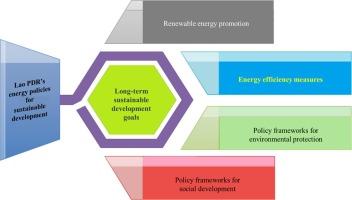Review of the Lao People’s Democratic Republic energy policies for sustainable development
IF 10.9
1区 工程技术
Q1 ENERGY & FUELS
引用次数: 0
Abstract
The Lao People’s Democratic Republic (Lao P.D.R) gets more than 70 % of its energy from conventional sources, which emphasizes the urgent need to switch to renewable energy. This study looks at the supply and demand scenario for energy in the Lao P.D.R. The need to reduce carbon emissions and enhance energy security in a country where over 60 % of the population lacks consistent access to electricity motivates this study. It is predicted that Laos can significantly enhance its energy sustainability by 2030 by implementing a diverse energy mix that includes at least 30 % renewable sources. A mixed-methods approach was used to evaluate the viability of different renewable technologies, including hydropower, solar electricity, and biomass, through the analysis of current energy policy, stakeholder interviews, and modeling scenarios. Findings indicate that switching to renewable energy could cut carbon emissions by up to 40 % and increase electrification rates by 80 % by 2030, provided that significant obstacles such as funding and technical capability are overcome. A coordinated effort among government, corporate sectors, and local communities is essential to addressing existing impediments, ultimately paving the way for a sustainable and resilient energy future in Laos.

审查老挝人民民主共和国促进可持续发展的能源政策
老挝人民民主共和国(Lao P.D.R) 70%以上的能源来自传统能源,这强调了转向可再生能源的迫切需要。这项研究着眼于老挝人民民主共和国的能源供需情况。在一个60%以上的人口无法持续获得电力的国家,减少碳排放和加强能源安全的必要性促使了这项研究。据预测,到2030年,老挝可以通过实施多样化的能源结构,包括至少30%的可再生能源,显著提高其能源可持续性。通过对当前能源政策、利益相关者访谈和建模情景的分析,采用混合方法来评估不同可再生能源技术的可行性,包括水电、太阳能发电和生物质能。研究结果表明,如果克服资金和技术能力等重大障碍,到2030年,转向可再生能源可以减少高达40%的碳排放,并将电气化率提高80%。政府、企业部门和当地社区之间的协调努力对于解决现有障碍至关重要,最终为老挝的可持续和有弹性的能源未来铺平道路。
本文章由计算机程序翻译,如有差异,请以英文原文为准。
求助全文
约1分钟内获得全文
求助全文
来源期刊

Energy Conversion and Management
工程技术-力学
CiteScore
19.00
自引率
11.50%
发文量
1304
审稿时长
17 days
期刊介绍:
The journal Energy Conversion and Management provides a forum for publishing original contributions and comprehensive technical review articles of interdisciplinary and original research on all important energy topics.
The topics considered include energy generation, utilization, conversion, storage, transmission, conservation, management and sustainability. These topics typically involve various types of energy such as mechanical, thermal, nuclear, chemical, electromagnetic, magnetic and electric. These energy types cover all known energy resources, including renewable resources (e.g., solar, bio, hydro, wind, geothermal and ocean energy), fossil fuels and nuclear resources.
 求助内容:
求助内容: 应助结果提醒方式:
应助结果提醒方式:


